Keyword research is an essential aspect of modern SEO and digital marketing. These are 11 of the best keyword research tools in 2022 that are guaranteed to increase website traffic.
You cannot simply create content for your website using only the keywords that you are familiar with. You need to plan ahead by obtaining insights into how people are searching in your space and the keywords they often use. That is when you need the best keyword research tool for your SEO.
Keyword research is an essential aspect of modern SEO and digital marketing.
Whether you are creating a new content approach or kickstarting your blog, using the right keywords is one of the most efficient ways to draw quality and consistent traffic to your website.
If you can find out the right keywords that people often search for to target, you will get your chance to rank much higher.
With hundreds of tools for keyword research available right now, finding the right one for your needs can be overwhelming, particularly if you are new to the SEO world.
This article shares the 11 best keyword research tools in 2022 that experts use to improve their site traffic. You will know the best feature each tool has, then be able to choose the best tool for your business.
11 Best Keyword Research Tools in 2022
1. Ahrefs Keyword Explorer

Ahrefs is currently one of the most effective or content developers.
The tool provides a comprehensive report to users and uses clickstream data to show select click metrics.
Its main features include:
- Comprehensive SERP analysis
- Precise keyword difficulty score
- Over 1000 keyword suggestions
- Supports more than 170 countries
- Click data for enhancing click-through rates (CTR)
- It gives an estimate of how many backlinks you will need to rank in the top 10 search results.
The platform comes in four differing plans.
The price for mid-sized companies, online marketers, and freelancers starts at $82 only per month if you go for an annual plan.
They also have a trial that goes for $7 for seven days on their Standard and Lite subscription plans.
2. SEMrush Keyword Magic Tool
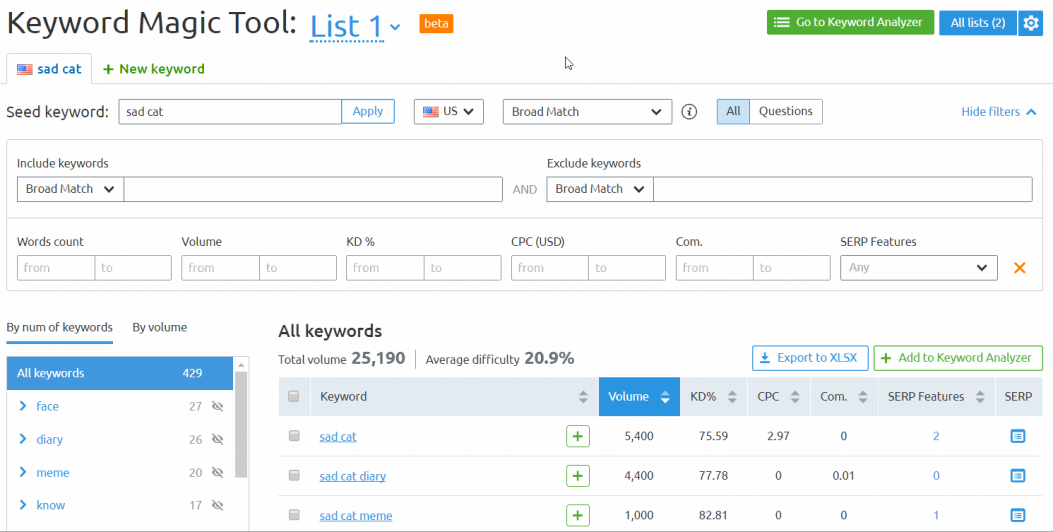
SEMrush is not your standard keyword research tool.
What Swiss Army Knife is to war, SEMrush is to SEO.
Instead of giving a long list of keywords, the tool shows you 5-10 particular keywords that your competition is already using to rank.
Some of its main features include:
- Uncovers ad group ideas and long-tail keywords for SEO
- Shows annual keyword trends
- Organic traffic analysis
- Keyword difficulty insights
- Global CPC distribution data
The platform comes with a 7-day free trial.
However, you must share your credit card details before you access the trial.
The trial option allows you to perform up to 10 queries per day.
It also comes with four pricing plans; Pro, Guru, Business, and Enterprise.
Pro is for limited budgets and starts at $83 per month.
Guru is ideal for small to mid-sized organizations and starts at $166 monthly.
On the other hand, the business plan is excellent for eCommerce agencies and stores and starts at$133.
The Enterprise plan is ideal for comprehensive content strategies.
3. BiQ Keyword Intelligence
BIQ’s SEO suite allows users to perform rank tracking, monitor website performance, and, most importantly, keyword research.
BiQ Keyword Intelligence is currently top-rated among bloggers, entrepreneurs, and marketers for a good reason.
Its main objective is to identify profitable keywords and enhance your site’s ranking on different search engines.
What’s more, you only pay for what you use!
So how does it work?
Besides showing search volume, users can also search for local keywords as well as their search intent.
All you have to do is key in the target keyword, then select your preferred language and locations.
Wonderful features of BiQ Keyword Intelligent:
- Give you a huge number of related keywords with detailed data, search intent, metrics, and value.
- Offer you a number of content ideas.
- Provide your keywords with the connected popular questions.
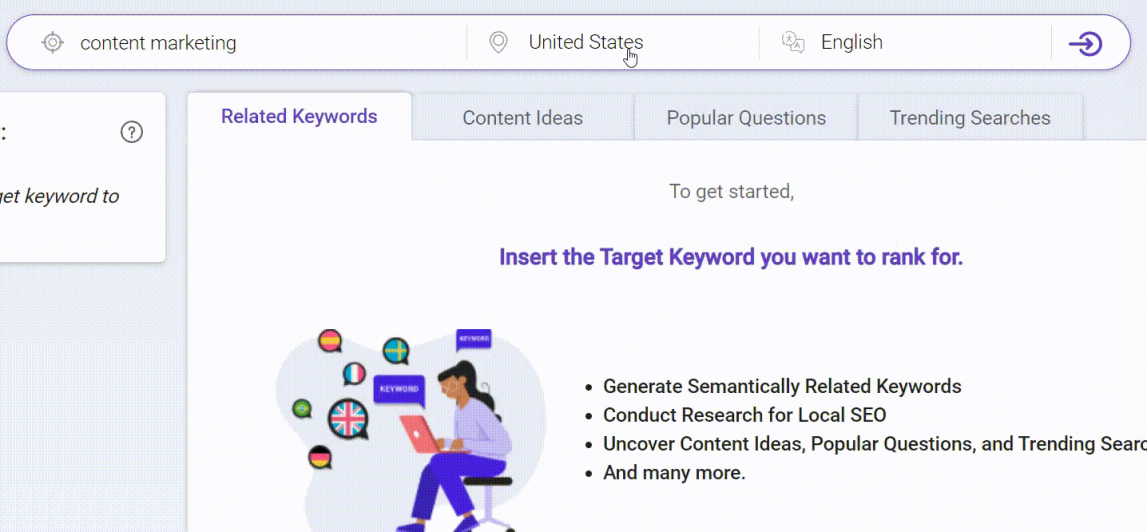
The fantastic tool will show all the relevant keywords locals are using to search for your product or service.
Depending on your preference, it is recommended that you go for a keyword phrase with high volume with lower competition.
You can also sort the keywords based on the value in Keyword intelligence.
Another aspect that makes this tool stand out is its ability to check a keyword’s intent.
For instance, if you want to identify a user’s intent when searching for “content marketing,” type the words into the search bar.
It will provide you with keyword intent percentages depending on the number of keyword-related keywords.

In the example above, the phrase has an informational intent meaning users are in the awareness phase, so they are looking for more information.
Thus, you can develop informative pieces like “best content marketing ideas” or “why is content marketing important?”
If you scroll down the page, you will see each keyword’s intent to help you understand your target audience.
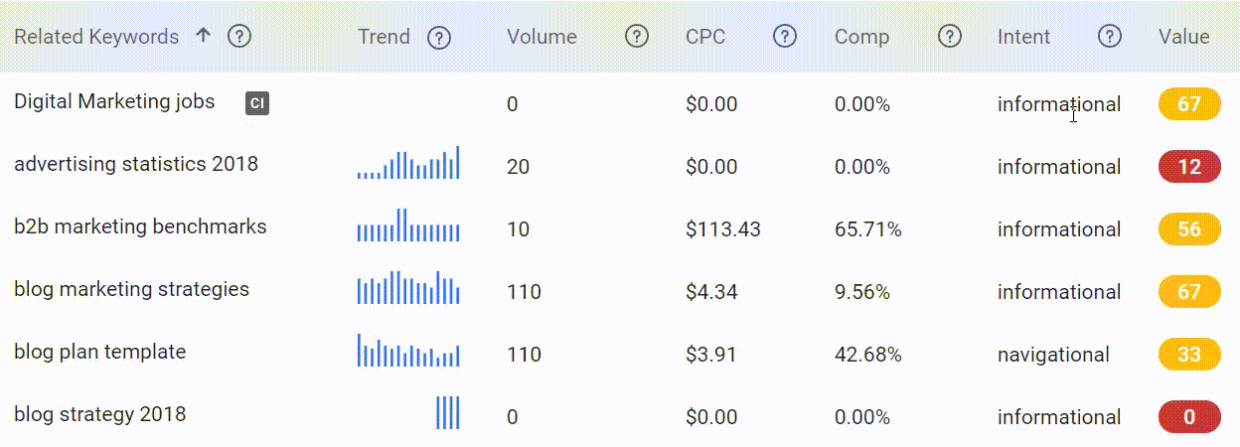
This is very handy as it gets rid of guesswork and assumptions in marketing.
4. Moz Keyword Explorer
Moz Keyword Explorer is not only a multifaceted keyword research platform that automates everything, but it also provides more actionable and valuable data.
From discovering keyword ideas to building lists to getting metrics and even filtering keywords, the tool is awash with tons of handy features.

Some of its features include:
- Keyword suggestions
- SERP evaluation
5. Ubersuggest
Ubersuggest is another useful and handy tool to perform keyword research for SEO.
The platform analyzes any keyword you throw at it to instantly show you hundreds of numerical and alphabetized related keywords.
You can also do more research by adding “bounce house ab, ac, ad” to discover more keywords that you can count on or utilize for SEO purposes.
The tools also show search volume, keyword suggestions, and keyword difficulty scores.
6. AnswerThePublic
Unlike other keyword research tools for SEO, AnswerThePublic presents keywords in an appealing visual format.
You can also download the keywords as a .csv file or a list.
This is an excellent tool for beginners in the keyword research world, as you do not need to have an account to use it.
All you have to do is key in your keyword and then check what pops up.
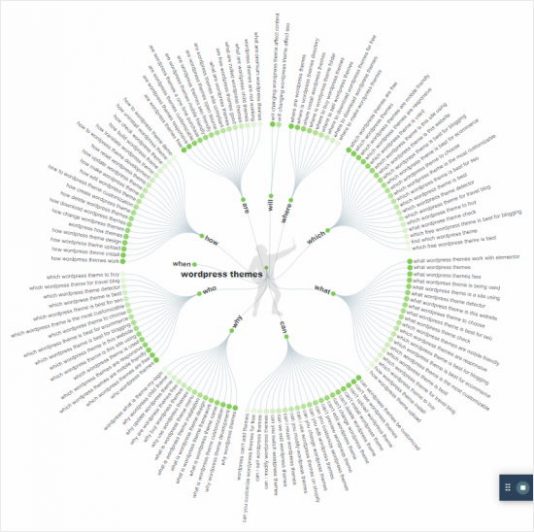
The research results from the tool are based on Bing’s auto-suggest/autocomplete features and Google.
Click on any of the keywords that show up to search for it on Google.
The new tab will show you what pieces are ranking for the term and if there is a snippet on it.
While the free version is a golden resource for bloggers, if you perform keyword research regularly, the pro plan is your best bet.
7. QuestionDB
QuestionDB derives keywords based on threads on Reddit.
It is great for content ideation, deep-diving into topics, and understanding your readers.
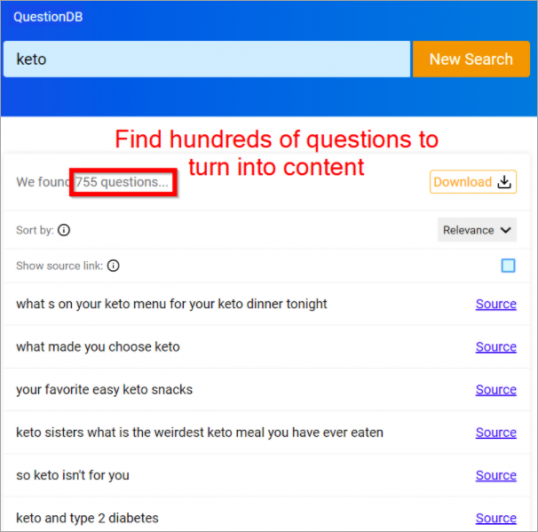
The free content idea generator will help you search thousands of user questions to allow you to get ideas for new content.
The free plan is for understanding your users and casual ideation.
For the paid plan, it is ideal for diving into topics and continuous ideation.
All you have to do is key in your target keyword, and the platform will show you tons of questions related to the keyword.
The tool will also give you ideas on what to write about.
Its main features include:
- Provides unlimited searches and API access
- The paid plan allows users to filter by new questions added to the platform.
- The paid plan offers up to 1000 results per search.
- The free plan allows users to sort by topic/popularity as well as download CSV
- THE free provides a maximum of 40 results per search
QuestionDB research tool is certainly a valuable and powerful tool for both marketers and writers.
It is not your ordinary keyword research tool as it works by researching millions of questions on the web and then provides a vast searchable database.
8. Google Trends
Google Trends shows the respective popularity of a specific keyword over time.
For instance, if you search for the term “costumes” for the last five or so years, you will discover that its popularity usually increases in October.

But why October?
Your guess is as good as mine; Halloween!
So how is this important for keyword research?
It can help you plan your year well.
For instance, if you have an eCommerce store that sells costumes, publishing articles on Halloween costumes every October would be a good idea.
Similarly, Google Trends can help you avoid targeting the wrong phrases.
Take a look at the image below where it shows the search volumes for “apple watch series 3 and series 5” on the platform.

If you were asked to create content for one of these terms, which one would you go for?
Normally, many will go for the keyword with higher search volume, but that is not always the right option.
Search volumes are averages of many months or years.
If you check information for the last 12 months in Google Trends, you will notice that queries for “apple watch series 5” overtook those for “apple series 3” recently.
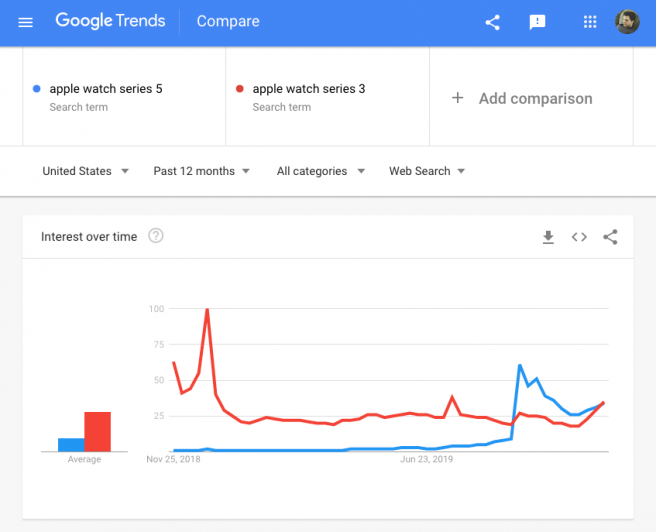
As such, if you sell Apple watches online, and you have to choose one of these keywords, the best option would be series 5.
Besides, queries for series three are only going to drop as time goes by.
09. Google Search Console

Just like analytics is meant to help monitor a website’s performance, Google Search Console is designed to help users enhance their site’s performance.
It will help you find data about the keywords readers were using to get to your website.
The tool will also help you discover the number of people who see your site in organic search results and the number of impressions that are turning into website visits.
Google Search Console also tracks the number of times your site has been backlinked (both from other sites and internally), which is important for SEO.
You will also be able to see any code errors on your site that may negatively affect your ranking.

On the flip side, the tool will not tell you how your site is ranking for specific keywords.
That’s a vital omission, particularly if you are considering a keyword-based campaign to improve your website’s visibility.
10. Google
There’s probably no other keyword research tool that is better than Google.
It provides an autocomplete feature when you type your search query.
Also, it has a “People also ask” section that shows related questions people are asking.
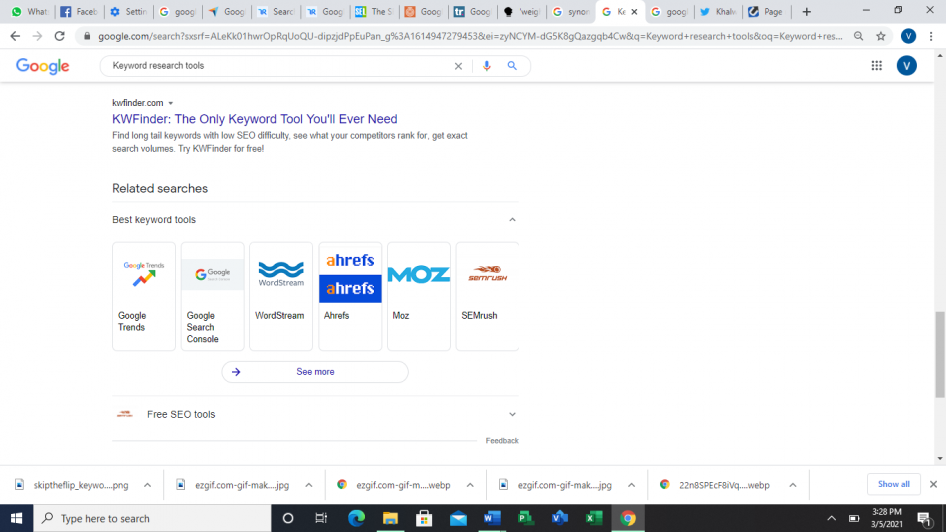
11. LSIGraph
LSIGraph is a powerful keyword research and content optimization suite. Its feature-rich Keyword Research module helps you find the most profitable keywords to target and it also comes with a SERP Analyzer to show you how top-ranking pages are structuring their content, and automated topic clustering.
LSIGraph will show you the data like keyword search volume, cost per click (CPC), competition, trend, and Opportunity Score.
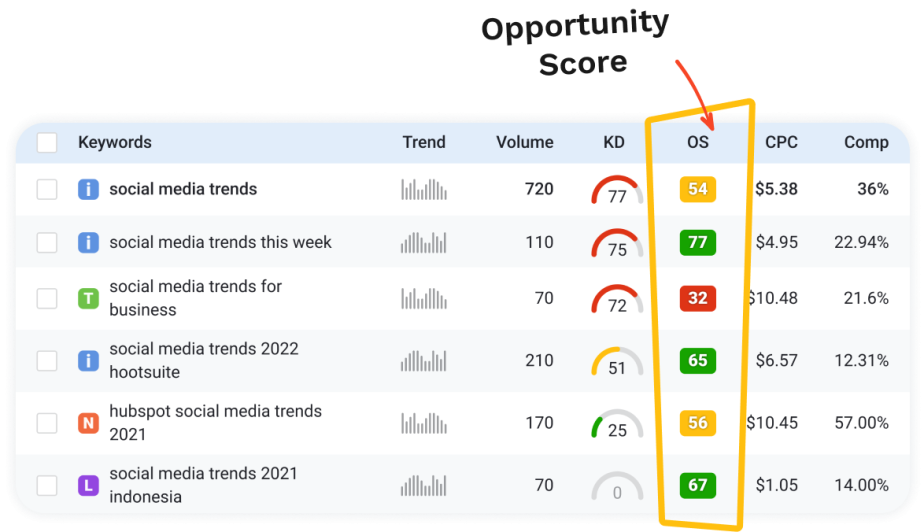
Opportunity Score (OS) is one of LSIGraph’s unique features. OS takes into account factors like search volume, keyword difficulty, and keyword length to tell you which keywords that you can rank for with the least effort.
LSIGraph’s SERP Analyzer shows you the important metrics of top-ranking pages like their content’s intent, keyword density, and the structure of their page. LSIGraph’s Topics Clusters automates the process of building keyword clusters by readily sorting the returned keywords under relevant topic umbrellas.
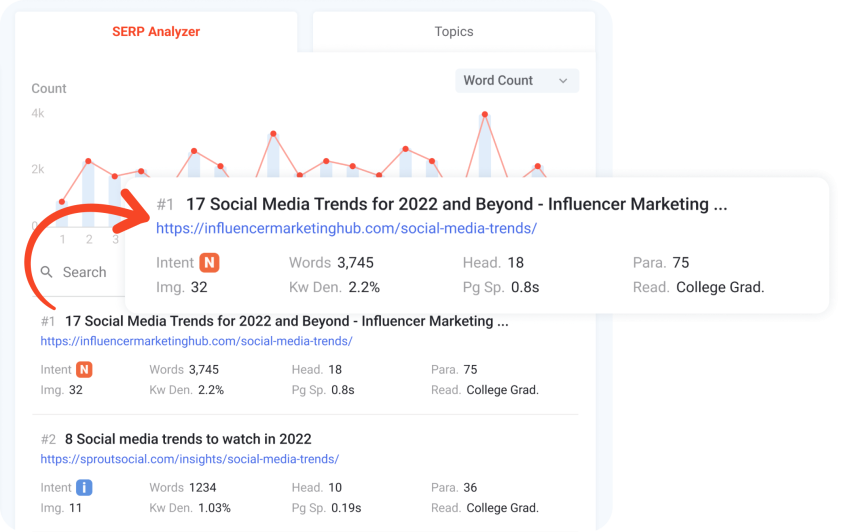
LSIGraph’s other features include:
- Semantic Writer, a writing assistant that analyzes your writing in real-time for SEO-worthiness.
- Keyword Mapper, which allows you to do your keyword mapping as visually as a node tree.
TL;DR
If you are looking for an effective and robust keyword research tool that provides complete results and actionable tips to help you understand and beat your competitors, you will not go wrong with these tools.
Here are the best keyword research tools in the market now: Ahrefs Keyword Explorer, SEMRush Keyword Magic Tool, BiQ Keyword Intelligence, Moz Keyword Explorer, UberSuggest, AnswerThePublic, QuestionDB, Google Trends, Google Search Console, Google, LSIGraph.
What’s your favorite keyword research tool?
If you want a tool that can find you semantic keywords and top content suggestions, LSIGraph is for you.




